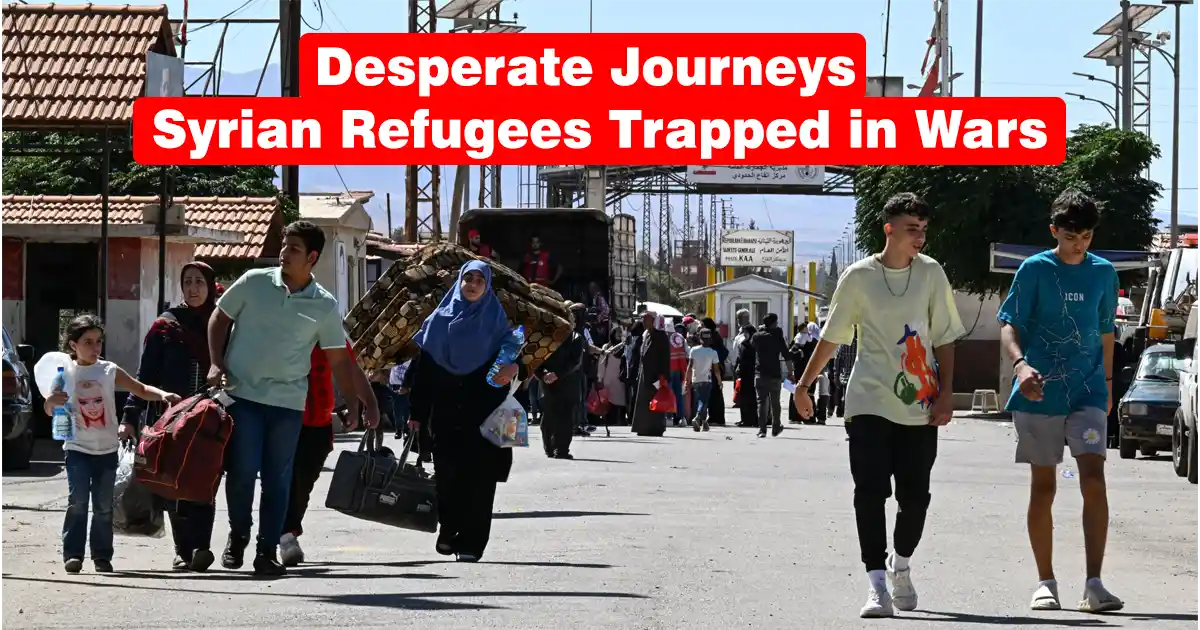From one war zone to the other, many Syrian refugees find them unable to escape the dangers they face, no matter where they turn.
Al-Bara, Syria – Musa Baghdadi spent $6,000 to escape from one war, only to land in another. “I paid to flee the bombing in Lebanon, only to return to my village, where Assad’s forces has also invaded,” Baghdadi speaks to Al Jazeera from his modest home in al-Bara, western Idlib.
His small, single-story house has been battered by over a decade of war. Its windows need replacement, and the walls bear the marks of shelling from Syrian regime forces. Still, Baghdadi counts himself lucky; many of his neighbors’ homes have been completely destroyed. Baghdadi, 64, is just one of more than 250,000 Syrians who have returned home since Israel’s full-scale attack on Lebanon began last month. Local media report the exact number as 253,284.
The Syrian Observatory for Human Rights (SOHR), based in London, reports that at least 176 Syrian refugees have been killed in Lebanon since Israel’s assaults escalated on September 21. Among them are 33 women and 46 children.
After spending 12 years in Lebanon, Baghdadi returned to Syria with his wife and four grandchildren, aged 11 to 14. Their father—Baghdadi’s son—was killed in 2012 when their house was blown-up. Their mother remarried and continued in Syria.
Fleeing Lebanon amid Rising Violence
Baghdadi first fled his home in al-Duwayr, southern Lebanon, as Israeli bombardment extended on September 21. His village had already faced Israeli assaults in August, part of the near-daily clashes between Israel and Hezbollah that began after Israel’s war on Gaza the previous year.
The family’s journey was uptight with hardship. On their first night, they slept on the streets of Sidon because the roads were too clogged with others fleeing the violence to move any further. The next day, they rented a house near Sidon for $350 a week, despite having no water or electricity. “It was better than sleeping on the street,” Baghdadi says. Many others shared his story, as landlords raised rents, exploiting those fleeing the violence.
A False Amnesty and the Threats of Returning to Syria
With the situation in Lebanon deteriorating, Baghdadi decided it was safer to return to Syria, even though the route home was dangerous. Crossing through areas controlled by Assad’s regime meant risking arrest or kidnapping by the Syrian military. Still, the prospect of staying in Lebanon seemed shoddier.
On September 22, as Israel’s attacks on Lebanon intensified, Syrian President Bashar al-Assad proclaimed a new amnesty for political prisoners and men avoiding military service. However, analysts were quick to point out that these promises were often hollow. Hadi al-Bahra, president of the Syrian National Coalition, labelled Assad’s decrees as deceptive, leaving political prisoners and activists still vulnerable. For Baghdadi, the risk of his family stumble upon regime forces was too great. He organized for a smuggler to guide them to Idlib, bypassing government checkpoints, for $6,000.
Exhausting Week-Long Journey Home
The journey back to al-Bara took seven days. Traveling under the cover of night, the family moved in a truck along rough agricultural roads to avoid detection by regime forces. The nights were especially disturbing, with the truck’s lights kept off to evade detection. When they finally reached their home village, Baghdadi’s wife, WardaYunis, wept with both respite and sorrow. “I was stunned by the destruction. Our home was in ruins,” she says.
Warda had been eager to return, pushing her husband to make the problematic decision. “We fled Lebanon 12 years ago to escape war, but now Israeli airstrikes are killing Syrians there. I’d rather die in my village,” she says.
The Cost of Absconding War
Between September 21 and October 3, about 235,000 people crossed from Lebanon into Syria by land, according to the International Organization for Migration (IOM). Syrians like Baghdadi confronted extortion along the way, with smugglers demanding money for safe passage past Assad’s checkpoints.
Mariam al-Qassem, a mother of four, also reverted to Syria during this period. After fleeing Sidon and staying briefly in a UNRWA shelter, she contacted a smuggler to arrange her return to the Idlib countryside. However, despite promises to avoid regime checkpoints, the smuggler unrestrained them at the Masnaa crossing, where her husband and son were detained for two hours before being released after paying bribes. The family was forced to pay at every checkpoint they met, a total of 10 times, before finally reaching the safety of opposition-held territory.
A Breakable Homecoming
For Baghdadi and others like him, the return home is bittersweet. After years of dislocation and extortion at the hands of regime forces, they arrive to find their homes destroyed. Despite this, they are grateful to be alive and back in familiar environs.
Baghdadi hopes for a future where his village can be restored, though the shelling continues. “I just hope I never have to leave again,” he says.
Source: (Al-Jazeera)


